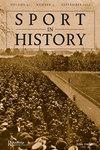What media coverage of the 1968 Olympic protests reveals about the deep structure of attitudes about athletic activism in the United States
IF 0.7
Q4 HOSPITALITY, LEISURE, SPORT & TOURISM
引用次数: 2
Abstract
ABSTRACT How do cultural norms, ideologies, and beliefs shape public opinion and media framing of race-based athletic activism? This paper uses media coverage of and commentary on the 1968 American ‘revolt of the Black athlete’ to explicate the deep cultural structures that help explain both support and opposition. The paper begins with a brief, schematic overview of the proposal for a Black Olympic boycott that was the centrepiece of 1968 organising and how it was reported by sports journalists and in the mainstream media. The second section identifies the reasons American reporters were, on the whole, so opposed to the proposed boycott: the inherent lack of support for the athletes’ racial change agenda and the far-more-familiar arguments that sports were not the proper venue for activism. The third section argues that a whole constellation of cultural norms and beliefs—about sport culture, colour-blind visions of racial justice, and liberal democratic ideals about politics and social change—coalesced to make race-based sport protest appear both unnecessary and inappropriate. The conclusion summarises the implications for understanding both public reception of and media responses to contemporary, race-based athletic activism as well as for tracking institutional changes and cultural shifts unfolding in the Black Lives Matter era.1968年奥运会抗议活动的媒体报道揭示了美国对体育激进主义态度的深层结构
文化规范、意识形态和信仰如何塑造公众舆论和基于种族的体育活动的媒体框架?本文利用媒体对1968年美国“黑人运动员的反抗”的报道和评论来解释深层的文化结构,这有助于解释支持和反对。第二部分指出了美国记者总体上如此反对拟议中的抵制的原因:对运动员的种族变革议程缺乏固有的支持,以及更熟悉的论点,即体育不是激进主义的合适场所。第三部分认为,整个文化规范和信仰的星座——关于体育文化,种族正义的色盲愿景,以及关于政治和社会变革的自由民主理想——结合在一起,使以种族为基础的体育抗议显得既不必要又不合适。结论总结了理解公众对当代以种族为基础的体育运动的接受和媒体反应的含义,以及跟踪在“黑人的命也重要”时代展开的制度变革和文化转变。
本文章由计算机程序翻译,如有差异,请以英文原文为准。
求助全文
约1分钟内获得全文
求助全文

 求助内容:
求助内容: 应助结果提醒方式:
应助结果提醒方式:


